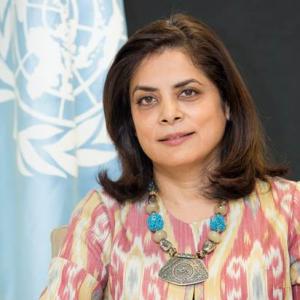Opening Remarks UN Resident Coordinator on World Water Day 2019
-
Ms Anita Nirody
United Nations Resident Coordinator (UNRC), Indonesia
Dr. rer.nat. Abdul Harris, Dean of the Faculty of Mathematics & Natural Science, University of Indonesia
Professor Dr. Arief Rachman, Excecutive Director and Chairman of the National Commission for UNESCO
Dr. lr. Hari Suprayogi, Director General of Water Resources, Ministry of Public Work Housing
Dr. Junardy, President of Indonesia Global Compact Network
Dr. Shahbaz Khan, UNESCO Director and Representative
Dear participants, members of the UN family, students
I am delighted to welcome you to this national celebration of the 2019 World Water Day on the theme “Leaving No One Behind” - and to the Indonesia launch of the 2019 World Water Development Report.
The global launch of this flagship United Nations report was held last month, in association with the global celebration of World Water Day, March 22. Today, we mark the formal handing over of the report to the Government of Indonesia by bringing together leading experts in the field of water management, national stakeholders, universities, and development partners for an exchange of views, ideas and aspirations to ensure the availability of water for all.
Water flows through the core of the United Nations’ mission. Access to safe water is a human right and – along with access to sanitation facilities – a key driver of sustainable development. This was recognized as by the United Nations General Assembly on 28 July 2010, with the adoption of a historical resolution recognizing “the right to safe and clean drinking water and sanitation as a human right that is essential for the full enjoyment of life and all human rights”.
Yet, nearly one third of the global population today do not use safely managed drinking water services and only two-fifths have access to safely managed sanitation services.
That is why the theme of this year’s World Water Day is “leaving no one behind”. The words echo the basic commitment of the United Nations 2030 Agenda and the Sustainable Development Goals. Water and sanitation make a significant contribution to the achievement of the 2030 Agenda: from food and energy security, to economic development and environmental sustainability. Water and sanitation for all are essential preconditions for eradicating poverty and for building prosperous, peaceful societies.
However, to fulfil this promise, water and sanitation must reach all, including the most vulnerable: the poverty-stricken, the displaced, the marginalized. This aspiration - to reach even the most vulnerable - is increasingly important. The combined impacts of environmental degradation, climate change, population growth and rapid urbanization represents a formidable challenge to the objective of attaining water security for all.
As the UN Secretary General Antonio Guterres has said on World Water Day: “Water is a human right. Nobody should be denied access.”
We have gathered here today because we recognize that people are being left behind in accessing water and proper sanitation for reasons that we can do something about. These include reasons related to gender, age, ethnicity, culture, migration status or socioeconomic status, among others. We are here because we understand that exclusion, discrimination, entrenched power asymmetries, poverty and material inequalities all serve as obstacles to fulfilling the human rights to water and sanitation - and by extension to achieving the Sustainable Development Goals.
Allow me to briefly outline the extent of the issue we face – because the impacts of limited access to water and sanitation affect billions of people. Three out of ten people do not have access to safe drinking water. Six out of ten do not have access to safely managed sanitation services, and one out of nine practices open defecation - with huge implications for human health and the environment.
Significantly, these global figures often mask substantial inequities between and within regions, countries, communities and even neighborhoods. Such contrasts and inequalities can be particularly striking between urban and rural settings.
To ‘leave no one behind’, we must focus our efforts on including people who have been marginalized or ignored. Water services must meet the needs of marginalized groups and their voices must be heard in decision-making processes. Regulatory and legal frameworks must recognize the right to water for all people, and sufficient funding must be fairly and effectively targeted at those who need it most.
As with most development challenges, women and girls suffer disproportionately. For example, women and girls in low-income countries spend some 40 billion hours a year collecting water. The time spent could be much better invested in earning a livelihood or – in the case of girls – attending school.
It will be incumbent upon national governments to dramatically increase the amounts of public funding made available for the expansion of water and sanitation services. Innovative partnerships with the private sector and international partners will be essential.
Adopting a human rights-based approach means advocating for the fundamental standards, principles and criteria of human rights frameworks. These include non-discrimination and participation that is active, free and meaningful, as well as representation by and for people in disadvantaged or vulnerable situations. Countries have the obligation to facilitate public participation and protect peoples’ rights to participate in decisions that affect them, through free, meaningful and genuine consultation processes.
Improved institutional capacity is required to assist and facilitate policy reforms and citizen’s participation at the appropriate levels of decision-making and policy implementation on the ground. The development of human capacity – through vocational, technical and academic training – needs to be supported, especially at the local and community levels.
By prioritizing those most in need, we can build more resilient communities, more equal societies and a more peaceful, sustainable world.
It is my sincere hope that today’s event can provide further inspiration and guidance towards these efforts, helping ensure that – truly - nobody is left behind.
I wish you an enjoyable, productive and inspiring discussion.
Thank you.
Speech by



